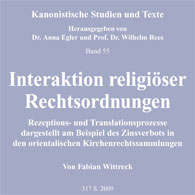(C4) The Ecclesiastical Jurisdiction of Religious Minorities − Factor of Integration or Segregation

In Great Britain, the consideration to give British Muslims the state-sanctioned possibility to settle certain disputes in accordance with the rules of the sari’a has recently created a furore. The almost unanimously negative response to this suggestion, with some almost flabbergasted reactions, proves that it touched on a raw nerve of current discussions about the role of religion in modern constitutional states. The accusation that thus hangs in the air is that parallel societies would even be protected by law as the secular state withdraws its claim to the constituting of and the compliance with the law in favour of a theonomously founded domestic law.
Admittedly, at the basis of this so very consentaneous reaction lies a hypothesis on the consequences – regarding both the sociology of both law and religion – of a religious jurisdiction in “secular” matters that is hardly supported empirically. The issue, therefore, needs to be dealt with in an academic way, which will be the task of the present project from the point of view of law history, the sociology of law and comparative law. The starting point will be the working hypothesis that a separate ecclesiastical jurisdiction of religious minorities generally has an ambivalent impact. Thus, the aim will be to name factors that, on an individual basis, turn the balance in favour of either integration or segregation.
The object of investigation will be the law of the so-called ancient Oriental churches, that is, those communities that detached themselves from the Imperial Church in the course of the Christological disputes of the fourth and fifth centuries, or those that were formed separately from it from the beginning, such as the East Syrian or “Nestorian” church. The oriental canon law lends itself as the object of investigation to the question outlined because no later than the seventh-century Islamic conquest of the Middle East, the leaders of these churches were exercising judicial power over their members also with regard to issues classified as “secular” from a modern point of view, specifically with regard to the law of succession and family law. In many states of the region such as Syria or Israel, this legal situation – termed the “millet system” in the Ottoman age – has continued until today.
The focus of the project’s first stage will be to analyse the relevant sources from the point of view of law history. This stage serves as the essential foundation for further analysis as regards the sociology of law or comparative law.
In a second stage, the results of this exploration will be matched from a diachronic perspective and the perspective of comparative law with the legal development of the Oriental churches in the twentieth century and in the present. It is to be outlined which changes the transition from pre-modern to modern cultures entails and how the transition is handled.
Finally, there is the possibility to study existing models of ecclesiastical jurisdiction in modern constitutional states from the perspective of both comparative law and the sociology of law in a way that breaks away from the Oriental churches and that would possibly also accomplish a closer analysis of Islamic and Jewish (arbitral) courts.

